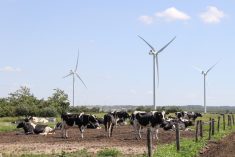Canada’s ag sector is expected to serve as a carbon sink, a renewable fuel source and a beneficiary in the federal Conservative Party’s new climate change plan — which now includes putting a price on carbon.
Party leader Erin O’Toole announced the new plan Thursday — after a long campaign of vehemently opposing such policy.
Billed as being backed by credible and professional modelling, the party’s proposed plan forecasts reducing emissions at the same pace as Canada’s current policy.
O’Toole is pledging the plan “will maintain a price on carbon, without one penny going to the government.”
Read Also

More Canadian companies at Agritechnica 2025
A record number of Canadian agriculture machinery and tech companies are at Agritechnica 2025, with exporters being more aggresive looking for new markets.
Doing so, the CPC says, will be accomplished by creating “personal low-carbon savings accounts” that will see consumers pay for pollution before receiving a rebate allowing them to make government-approved green purchases.
Also included in the plan is a tax credit for carbon capture, utilization and storage (CCUS) to “rapidly accelerate” deployment of the technology “in the energy sector and in important industries that have few alternatives to burning fossil fuels, like fertilizer and chemical production.” A $5 billion spending pledge is tied to CCUS.
The party also seeks to introduce a renewable natural gas mandate, based on British Columbia’s policy, in which 15 per cent of downstream natural gas consumption would be required to come from renewable sources by 2030.
That mandate would be filled in part by capturing methane from “organic sources such as farms and landfills,” which the CPC said would reduce gas-fired equipment’s impact on the environment and “the methane that is wasted from agriculture, sewage and landfills will be significantly reduced.”
The party says it will also invest $3 billion before 2030 in “natural climate solutions focused on management of forest, crop and grazing lands and restoration of grasslands, wetlands and forests.”
Sustainable practices in agriculture would be recognized in several measures, such as “establishing transparent and reliable standards for carbon credits associated with land management practices with the eventual goal of establishing a national carbon offset market.”
The governing Liberals are in the midst of developing similar policy. Critics of that plan, however, have said the federal government isn’t recognizing emissions-reducing practices, such as low/no-till and 4R Nutrient Stewardship. O’Toole’s plan pledges to do so.
O’Toole’s plan says a CPC government would explore “the use of incentives to preserve and enhance natural infrastructure on private lands that contribute to climate mitigation and adaptation, with a particular focus on working landscapes with downstream impacts on populated areas.”
International trade was clearly in mind of the new policy’s authors, as it aims to tie Canada’s price on carbon to major trading partners such as the United States and European Union.
“This will ensure that we travel the path to our Paris targets together while reducing the risk that serious climate action will just shift jobs out of Canada to competitor countries,” the plan says.
“We will assess progress after two years and be prepared to set industrial carbon prices on a path to $170/tonne by 2030, but only if the combination of adopting a price based on that of our major trading partners and working with the U.S. on North American standards has not assured us that we are on a path to our Paris commitment.”
O’Toole also says he will propose minimum North American standards to Joe Biden’s administration for key industrial sectors, “backed up by border carbon adjustments to prevent leakage of emissions — and jobs — to countries with lower environmental and emissions standards like China. This will allow us to raise standards for trade-exposed sectors.”
To force high-polluting countries such as China to “clean up their act,” the CPC says it will study setting up carbon border tariffs that “reflect the amount of carbon emissions attributed to goods imported into Canada.”
“Producers in countries with emissions reductions mechanisms that are compatible with our own will be exempt. We will urge our American trade partners to adopt this approach as well.”
Carbon border adjustments are a hot topic in international trade circles, including in the European Union, where its Green Deal includes plans, albeit contentious and complicated ones, for the world’s first carbon tariff.
O’Toole’s announcement of a price on carbon incited strong pushback from loyal CPC members, including many on the Prairies. Already on tenuous ground with his members, O’Toole is gambling having a credible climate plan will succeed in brining moderate voters into the fold.
“Wherever carbon taxes have been tried, governments have been unable to resist the billions of dollars they bring in,” the CPC said in its plan.
“This is true in Canada today, where the Trudeau government is only returning to Canadians some of the revenue the carbon tax brings in — and where some Canadians, particularly farmers and those living in rural areas, are unfairly penalized.”
O’Toole’s predecessor, Andrew Scheer, largely ran and lost the 2019 election on the need for carbon pricing. The majority of voters chose a party with a plan to price carbon.
‘Very concerned’
Maintaining the enthusiastic support of CPC members who continue to oppose such policy will be a challenge. For farmers, in particular, the pending increases in the governing Liberals’ tax on carbon are a sore spot.
A new poll of 719 Canadian farmers, run April 9-10 by Stratus Ag Research, saw the “rising cost of carbon tax” ranking highest on a list of springtime concerns about which respondents described themselves as “very concerned.”
Specifically, 62.3 per cent of respondents in the Stratus poll said they were “very concerned” about the rising cost of the carbon tax — ranked ahead of the rising prices of ag inputs generally (44.5 per cent), drought conditions (38.2 per cent), volatility in commodity prices (22.1 per cent) and trade disruptions (18.9 per cent).
Respondents ranking themselves as either a 5 or 4 on a concern scale of 1 (not at all concerned) to 5 (very concerned) about carbon tax costs totalled 81.1 per cent, just behind rising input prices at 81.9 per cent.
Stratus, based near Guelph, said its poll sample is considered accurate plus or minus 3.7 per cent 19 times out of 20.
Farmers’ level of concern aside, those who have long opposed carbon pricing aren’t likely to find a political home elsewhere, as each of Canada’s major federal parties remains in favour of it.
Saskatchewan Premier Scott Moe, for one, appears to place himself in this category. While claiming he remains opposed to both plans, he was quoted this week as favouring the CPC over the Liberals.
It is unlikely Moe and his caucus colleagues in the governing Saskatchewan Party will be forced to burn their CPC membership cards, as the few remaining Saskatchewan Party MLAs with Liberal memberships did following the introduction of Trudeau’s price on carbon.
A federal carbon pricing plan will only be needed in instances where provinces choose not to implement an adequate climate plan of their own.
— D.C. Fraser reports for Glacier FarmMedia from Ottawa. Includes files from Glacier FarmMedia Network staff.














